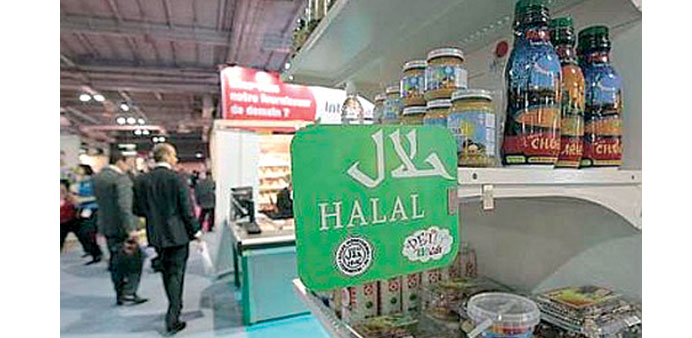DPA/Kuala Lumpur
From the moment she wakes up until the time she goes to bed, Faridah only uses halal products.
“I feel happy that there are now products in the market for women like me which also satisfy my needs as a Muslim,” the 19-year-old Malaysian university student said.
For two years she has been using all halal personal care products, such as soap, shampoo, conditioner, perfume, cleansing cream, whitening cream and body scrub, produced by a local firm.
“These are just as good as the branded ones I used before,” she said.
Faridah is one of a growing number of modern Muslims driving a growing and evolving market for products certified halal, or allowed, under Islamic rules.
As global supply chains become more complex and less transparent, companies which can guarantee entire manufacturing and shipping processes that are free of any pork or alcohol derivatives are finding lucrative customer bases.
And they are not limited to food, as Muslims are being won over by the quality of halal substitutes in the production of a wide range of goods.
“Halal antibiotics and paracetamols are just as potent as regular medicines and at the same price as branded non-halal medicines,” said Mahmoud Mansor, 55, a government employee who switched in 2000.
“By taking only halal medicines, I also keep my religious obligation as a Muslim,” he said.
Much standard medication is made with alcohol solvents, or gelatin from pork or from other animals not slaughtered according to halal guidelines.
Strict interpretation of halal extends beyond ingested products. The ink used in voting booths in the May election was certified halal and alcohol-free for the first time, and there is growing demand for textiles using only natural dyes and organic-grown fibres.
Darhim Dali Hashim, director of the International Halal Integrity Alliance Ltd, says this also reflects the concern of young Muslims for more than just religious probity.
“About 30% of Muslims are below 25 years old and the next generation of consumers are not just concerned about the religious requirement but they are also concerned about the ecological requirement,” he said.
“This is across the board, whether non-Muslim or Muslim, so we have to take advantage of these requirements.”
But the main halal market remains the world’s estimated 1.8bn Muslims, and is worth an estimated $2.1tn annually, according to Malaysian government-run Halal Industry Development Corp Sdn Bhd.
The organisation is responsible for developing the country’s halal industry, and is making inroads. Malaysia’s halal exports totalled $11bn in 2012, with China, Singapore, the US, the Netherlands and Indonesia as the main markets, it said.
Chief executive Jamil Bidin said innovation is critical for competitivity of Malaysia, and his organisation is now focusing on halal ingredients for food, cosmetics and pharmaceutical products.
“As you know, if you want to produce halal products, you need halal ingredients and I see that no country in the world now is,” he said.
QSR Brands Holdings Sdn Bhd is one example of the potential for an integrated halal supply chain in the international market.
The Malaysian company operates a chicken-product supplier as well as halal Pizza Hut and KFC restaurants, with 859 of the fast-food outlets in Malaysia, and 142 in Singapore, Brunei, Cambodia and India, according to Mohamed Roslan Saludin, general manager of its Shariah (Islamic law) and halal compliance department.
“All our businesses are strictly halal,” he said, adding that the company has posted double-digit growth in revenues for the past five years, with 3.6bn ringgit (1.09bn dollars) in 2012.
Malaysian firms are also aggressively developing halal logistics, Jamil said, an area vital for halal retail.
For example, a package of halal meat that is not properly warehoused or transported could become “non-halal” if it comes into contact with non-halal products at any stage of the process, he said.
“You must have dedicated cold rooms, warehouses, transport containers, lorries and vans exclusive for halal products.”
Roniel De La Vega, 35, said he believes halal products would appeal even to non-Muslims, especially for people who are health conscious and concerned about the environment.
De La Vega, a Filipino Catholic, said that since he started working in Kuala Lumpur six years ago he has come to love halal food and products.
“I eat halal pizza, burgers, and other fast food meals and I feel confident that they only have natural ingredients,” he said. “I also take halal medicines and use halal soaps and shampoos because I am confident they do not have synthetic chemicals that might be harmful to my health.”

